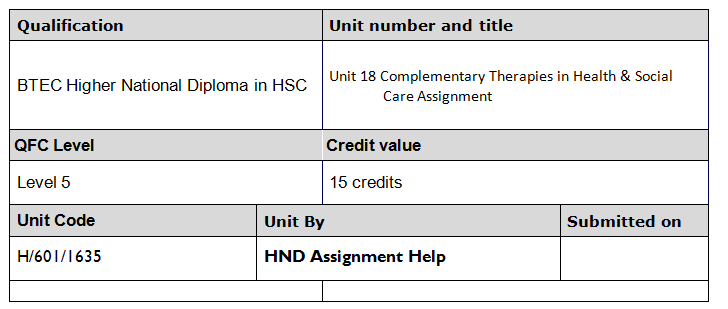Unit 18 Complementary Therapies in Health Social Care Assignment

|
Qualification |
Unit number and title |
||
|
HSC |
Unit 18 Complementary Therapies in Health & Social Care Assignment |
||
|
QFC Level |
Credit value |
||
|
Level 5 |
15 credits |
||
|
Unit Code |
Unit By |
Submitted on |
|
|
H/601/1635 |
Locus Assignment Help |
|
|
Task One: Principles behind complementary therapies
Write a report:
Scenario:
You have just become the new marketing manager for “Lifeline” complementary therapy ce Congratulations! online. Through this report you will demonstrate your knowledge of complementary therapies and Your first task now is to write a report which will be placed in Doctors waiting rooms and be posted educate others.
Explain the different types of complementary therapies briefly. In this you now have to sell the “Lifeline “complementary health centre by discussing what each complimentary therapy is, including their treatment processes which could include signs and symptoms, administration, frequency/dosage:
The “Lifeline “complimentary health centre offers the following range of therapies:
|
Pharmaceutical mediated: |
Physically mediated: |
Psychological mediated: |
|
Herbal Medicine |
Reflexology, Osteopathy, |
Counseling |
|
Homeopathy |
Acupuncture Aromatherapy Chiropractic yoga |
Hypnotherapy |
|
|
Alexander Technique |
Psychotherapy |
Assess two complementary therapies. You must include both advantages (e.g. enhancing health, amelioration of symptoms etc.) and disadvantages (e.g. contraindications, intrinsic harm etc.).
Analyze the factors that could influence access to complementary therapies which could include physical or geographical factors alongside socio-economic, cultural, educational factors and referral systems.
Task two: Complimentary VS Orthodox (2.1, 2.2, 2.3 and 2.4)
Essay:
Scenario:
The director of the “Lifeline” complementary therapy centre is very pleased with the success of your report and you have been offered a pay rise! However before that can happen you will need to submit an essay, discussing Complementary versus Orthodox Medicine.For this task you should write an essay to clearly analyse the role of complementary therapies in relation to orthodox treatments
To do this choose a disorder and compare the role of two complimentary therapies in treating that disorder with those of orthodox treatments.
In making your comparison you could consider:
- Muscular-skeletal disorders: e.g. bones, joints, muscles, mobility, pain
- Metabolic Disorders: e.g. digestive and eliminatory processes, endocrine functioning, immune function, reproductive function
- Cardio-respiratory Disorders: e.g. pulmonary functioning, cardiovascular functioning
Evaluate the attitudes in general towards complimentary therapies.
Assess the psychological effects of the two complimentary therapies: mental health, e.g. stress, depression; those with learning difficulties, e.g. autism
Briefly explain what contraindications are and compare the contra-indications between orthodox and complimentary therapies and give examples of when they might exist e.g. pregnancy
Contact us
Get assignment help from full time dedicated experts of Locus assignments.
Call us: +44 – 7497 786 317Email: support@locusassignments.com
Task Three: The efficacy of Complimentary therapies
Information booklet:
Scenario:
Congratulations! The “Lifeline” complementary therapy centre is growing in reputation and gaining a strong customer base and now asked you to write an information booklet to help others understand the role of complementary therapies in maintaining health and wellbeing.
- Analyzing the reliability and validity of the Information sources on the complimentary therapy: This is a good way of evaluating effectiveness. Aim to get a balanced evaluation which could include information which has been gained from different sources e.g. therapy practitioners, health professionals, commercial sources, science, systematic research amongst others.
- Evaluating the Evidence: Within this booklet you must mention problems or conditions where there is evidence that this therapy improves/does not improve conditions. – this could be done by mentioning clinical research, clinical studies undertaken, statistics, complementary therapy working in conjunction with orthodox medicine or by the use of a short case study of an individual.
- Based on all the evidence you have gathered which of the two complimentary therapies which you have evaluated, would you recommend for a specific group of users of health and social care services and why. Choose a group of users that you think would most benefit from this type of therapy.
Task four: Regulating Complimentary therapies (4.1 and 4.2) Preparation Power Point:
Scenario:
The management at the “Lifeline” complementary therapy centre has a reputation to retain and have identified some staff training needs. As part of the training they have organized a training day. In one of the activities you have to join a group discussion for the managers and senior staff members at the center. In this prepare a power point presentation to discuss the effectiveness of regulatory systems.
Before participating in the group discussion, you will need to do some research and prepare your slides that you will use to express your ideas and opinions about how complementary therapies are regulated.

For this task you will need to:
4.1
- Accurately identify what existing legislation; codes of ethics, codes of practice are in place to regulate the use of complementary therapies in society.
- Explain two of these regulation systems and
- Evaluate the effectiveness of one of these regulation systems discussing its advantages and disadvantages., benefits,
4.2 Make recommendation supported by evidence for improving for the use of complementary therapies
E.g. how to minimising risk, how to improve professionalism, how to develop public understanding, working with orthodox therapies.
Details
Other Assignments
Related Solutions